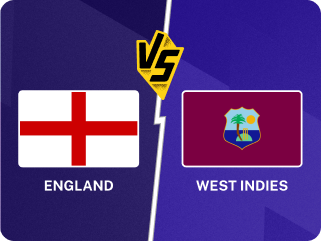
Shane Warne arrived in England ahead of the 1993 Ashes without much record or reputation. By the end of the series, he had become the game’s new icon. Writing for Wisden Cricket Monthly, Rob Smyth retraces that landmark summer, speaking to those who had the task of facing him.
This article first appeared in issue 22 of Wisden Cricket Monthly. Subscribe here.
The story of Shane Warne’s debut Ashes series is usually told in one ball. It has its own Wikipedia page, its own song (Jiggery Pokery by the Duckworth Lewis Method) and its own mythology. But while the theatre and symbolism of that delivery to Mike Gatting are unimprovable, the full story of Warne’s 1993 Ashes is a little more Homeric. It is told in 2,639 deliveries – the most ever bowled in a Test series, during which he made himself at home in England’s subconscious.
If the ‘Ball of the Century’ was a killer lead single, the album that followed was full of subtler classics. It revealed a bit more with each listen: variety, intelligence, aura and much else besides. Some mystery spinners are one-hit wonders; by the end of the 1993 Ashes, when Australia had won 4-1 and Warne had 34 wickets at 25.79 in six Tests, it was clear England were dealing with a potential all-time great.
“I faced some of the fastest bowlers in history,” says Robin Smith. “But Warnie was the one bowler who really intimidated me. Give me Sylvester Clarke on a dodgy pitch over Warnie any day of the week. Clarke might knock me out; Warnie would just get me out.” Smith, and England, were neither forewarned nor forearmed.
“My memories are that we knew very little about him beforehand,” says Mike Atherton, one of only three England batsmen to play all six Tests that summer. “It was different then – there wasn’t the dissemination of information there is now, and I can’t remember any footage being made available. There certainly wasn’t a sense of threat about Warne before the series.”
There were a few reasons for that. Warne had a modest Test record, averaging 31 after 11 games, although he’d had a good Australian summer against West Indies and especially New Zealand. It rained so much before the first Test at Old Trafford that the England players – and Warne himself – thought Australia might prefer the finger-spinner Tim May. And in a tour game at Worcester a month earlier, Graeme Hick had butchered Warne while making 187, including a burst of four sixes in 10 balls. There was one unknown caveat: Allan Border had told Warne to bowl nothing but leg-spinners and keep his variations under wraps.
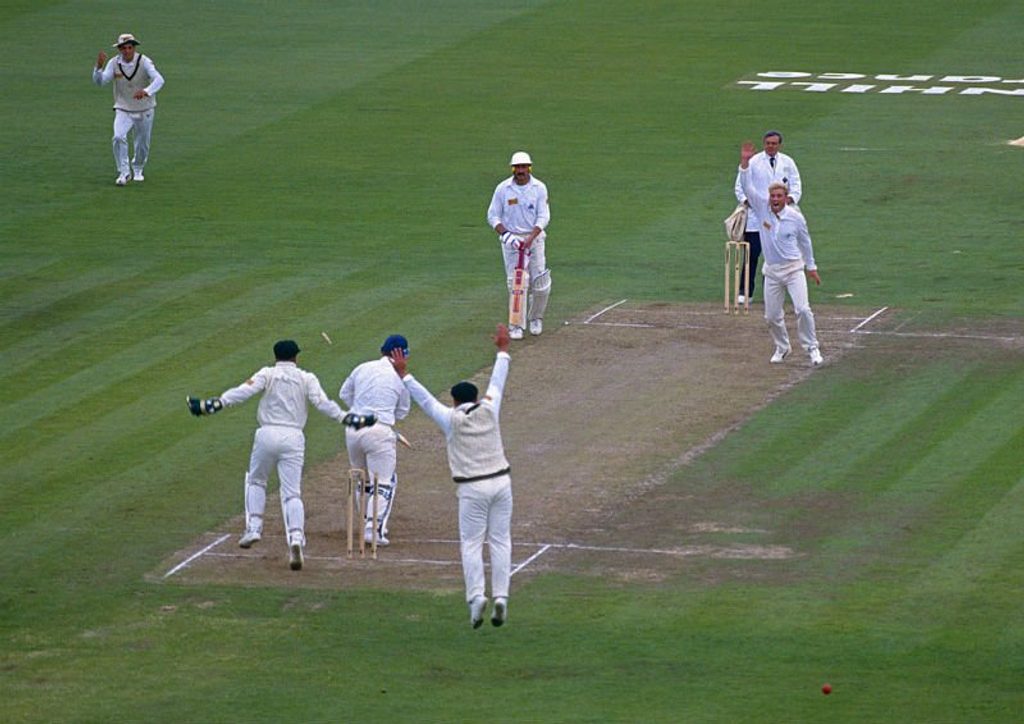 Shane Warne reacts after bamboozling Mike Gatting with cricket’s most iconic delivery
Shane Warne reacts after bamboozling Mike Gatting with cricket’s most iconic delivery
One ball changed everything. The story of Warne’s delivery to Mike Gatting has been told a million times, which makes it harder to remember how it was received at the time. Although it went into folklore, its immediate impact was not necessarily as dramatic as legend has it. “The notion that suddenly this ball destabilised the dressing room is complete nonsense,” says Atherton. “It was obviously a brilliant delivery and a startling moment, but I can’t remember whispers going round the dressing room after that. As always in a dressing-room, you look up, he’s out, and you get on with things.”
Hick has a similar memory. “It had obviously drifted and spun a lot, but I wouldn’t say there was any great buzz about it,” he says. “A ball like that makes you realise what a person can do, so you have to work out a plan to counteract it when it’s your turn.”
This was long before YouTube, so most people – even those involved in the match – only saw the ball a few times on TV. At the end of that second day, the England coach Keith Fletcher partly attributed Warne’s success to a “rogue” pitch. “Warne is a good bowler but we are not particularly worried about him,” he said. “He won’t turn it so much elsewhere.” It’s easy to snigger now, although at the time many good judges agreed with Fletcher that they had never seen an English pitch turn as much.
What nobody knew is that Warne could turn it viciously on anything, especially from outside leg stump. He redefined bowling round the wicket, making it an angle of attack, and made batsmen fear the blind spot behind them. He finished the Lord’s Test by bowling Peter Such and Phil Tufnell behind their legs, and did the same to Graham Gooch at Edgbaston.
Warne imparted so many revolutions on the ball that prodigious turn – and the accompanying drift – were his biggest weapons. Graham Thorpe, who with Gooch was the only England batsman to make a century in the series, says he has never seen anyone drift the ball like Warne in his early years.
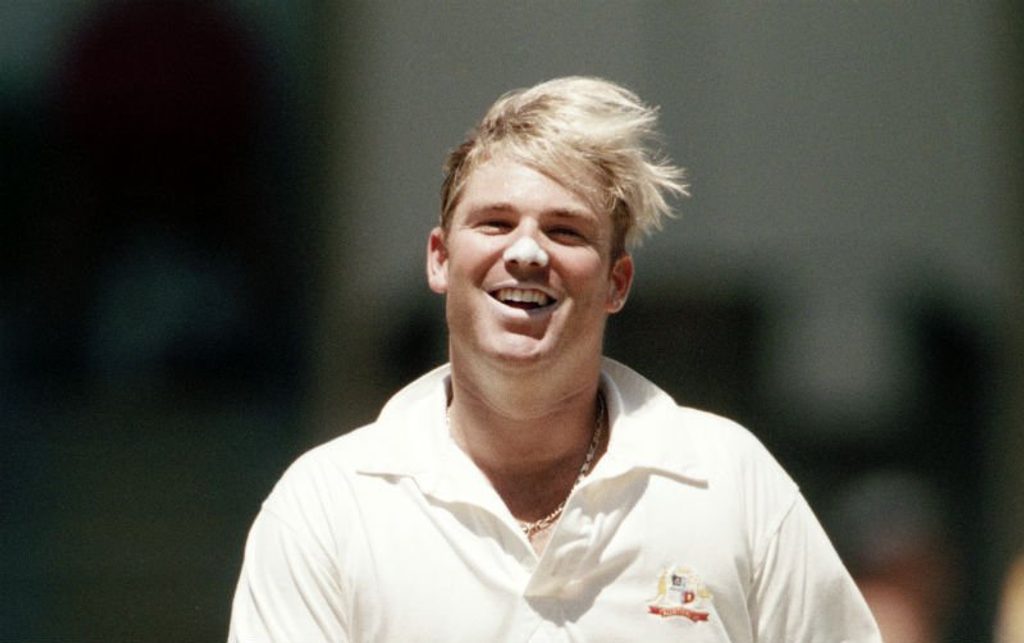 Warne could turn it viciously on anything
Warne could turn it viciously on anything
“At that stage, his shoulder was fine,” says Atherton. “He bowled the genuine flipper, which he kind of put away afterwards, and the googly as well. He had all the tricks.”
Some struggled to read his variations. Others didn’t even know what they were. When Matthew Maynard was bowled by Warne’s flipper at The Oval, he could barely have been more surprised if he’d seen a five-legged cat. It was the first time he’d received the delivery – not just from Warne, but from anyone. “There was no feel for leg-spin in the English game,” says Atherton. “That was a real advantage for him.”
England had faced Mushtaq Ahmed and Anil Kumble in the previous year, but Warne was a very different kind of leg-spinner. Few people had any frame of reference. In his Daily Express column, after the second day of the Old Trafford Test, Ray Illingworth was taken back to the 1940s. “Warne,” he said, “reminds me of Bruce Dooland – some compliment.”
It helped that England were such good hosts. They could barely have been more accommodating to Warne had they introduced a fag break every hour. Thorpe, brought in for the third Test, was the only left-hander they picked all series, and 33 of Warne’s 34 wickets were right-handers. The pitches also turned throughout the summer. The off-spinner Tim May played the last five Tests and took 21 wickets at 28. Gooch, Atherton and Smith all use the same word to describe May – “underrated” – while Thorpe, as a left-hander, found him a tougher challenge than Warne in that series.
May and Warne each had a cricket IQ that was Mensa level. Atherton and Stewart both describe Warne as the smartest bowler they ever faced. And though he had to rely on his wiles less in 1993 than later in his career when his shoulder became an issue, there were still signs of his ability to set a batsman up.
The most famous example came in the fifth Test at Edgbaston, when Warne took a wicket that gave him even more satisfaction than the Gatting ball. “For me,” he said, “the biggest thrill is the deception.” At the end of the third day, in the bar with his captain Border, Warne outlined a plan to bowl Gooch round his legs. Border was unsure but told Warne to try it. The next day, it happened exactly as Warne said it would. The first thing he did was run to Border, joyously shouting, “I told you!”
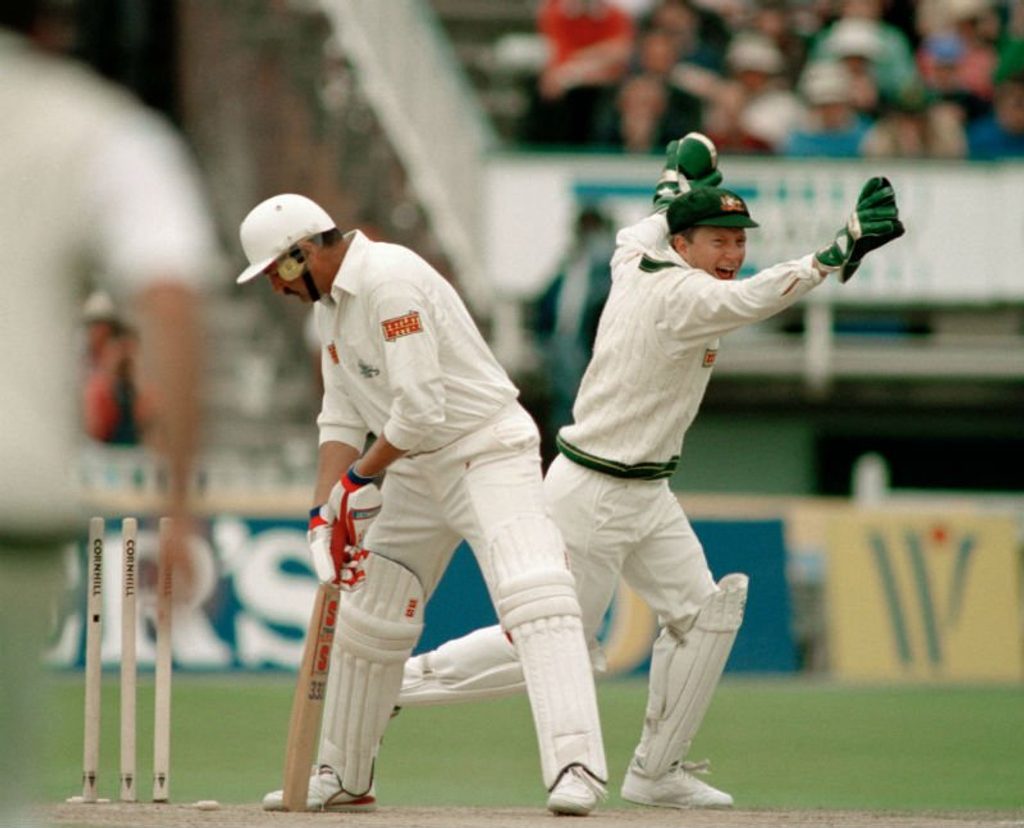 A master plan comes to fruition as Gooch is bowled round his pads by Warne
A master plan comes to fruition as Gooch is bowled round his pads by Warne
Warne says Gooch is the greatest England batsman he bowled to, just ahead of Kevin Pietersen. In the 1993 series he called him ‘Mr Gooch’ – a mark of respect, he said, but one which Gooch thought was overdone and at least partly sarcastic. Either way, the mutual respect was sincere, and both loved facing each other. Warne got Gooch five times in 1993, more than any other batsman, but Gooch’s 673 runs were the most on either side.
For the England batsmen, runs against Warne were a badge of honour. “I always enjoyed playing against Warnie,” says Atherton. “I always found him a pretty straight-up competitor, as I did with a lot of their players, actually. He had a few words on the field but he was the kind of guy that, if you played well, would look you in the eye and say, ‘Well played’.”
Later in his career, as his shoulder deteriorated, Warne became more accomplished at sledging batsmen out. In 1993, that wasn’t really the case. There were, inevitably, a few reminders that Australia were sponsored by XXXX – Maynard was told to “take that f***ing shot back to Wales” when he padded up to the flipper – but for the most part he didn’t need to get his mouth dirty. Besides, he had people to do that for him.
Ian Healy, the wicketkeeper, was Warne’s consigliere, who tried to unsettle batsmen with sly, dry comments. At Edgbaston, when Thorpe was left with only Such and Mark Ilott, he played a defensive stroke off Warne. Healy observed to his teammates that Thorpe was “playing for red ink”. The accusation was a red rag. “F**k this,” thought Thorpe. “I’m not playing for myself. I’ll show you.” And he did, by charging down the wicket and deleting that red ink. Thorpe stumped and sledged Healy b Warne 60.
That was the only time Thorpe was dismissed by Warne in the series. He felt reasonably comfortable against him – but he knew, at that stage, he could not dominate him. Warne confounded every English assumption about leg-spin bowling, but perhaps the most problematic was the fact he bowled hardly any bad balls. He went for 1.99 an over during the series and bowled a frankly ludicrous 178 maidens, more than twice as many as in any other series throughout his career. It was the slowest torture.
England were relatively good at surviving against Warne – his strike rate in the series was 78, compared to his career strike rate of 57 – but that was often the extent of their ambition. “He was so accurate that he gave you nothing,” says Smith. “There was a drip effect until it all became too much.”
Atherton played beautifully for much of the series, making six fifties, but did not reach three figures. An unfortunate slip at Lord’s when on 99 was only one reason for that. “I never felt as though I was dominating, and that’s why I would often get out between 50 and 100,” he says. “It took me quite a while to get those runs, and that was because of Warne and May. They had constant control.”
When Warne did bowl a bad delivery, his force of personality sometimes turned it into a wicket-taking ball. Gooch cuffed a long hop to mid-wicket at Old Trafford; Stewart slapped a full toss to cover at Trent Bridge. “He was a once-in-a-lifetime cricketer,” said Stewart. “He controlled me.”
He also controlled Smith, who suffered a crisis of confidence and method. In the first innings at Old Trafford, he edged a beautiful delivery – as good as the Gatting ball, in Richie Benaud’s opinion – to slip. But he played with hard hands and was criticised accordingly. In the second innings he softened his hands against Warne – and watched in horror as a defensive shot span back onto the stumps.
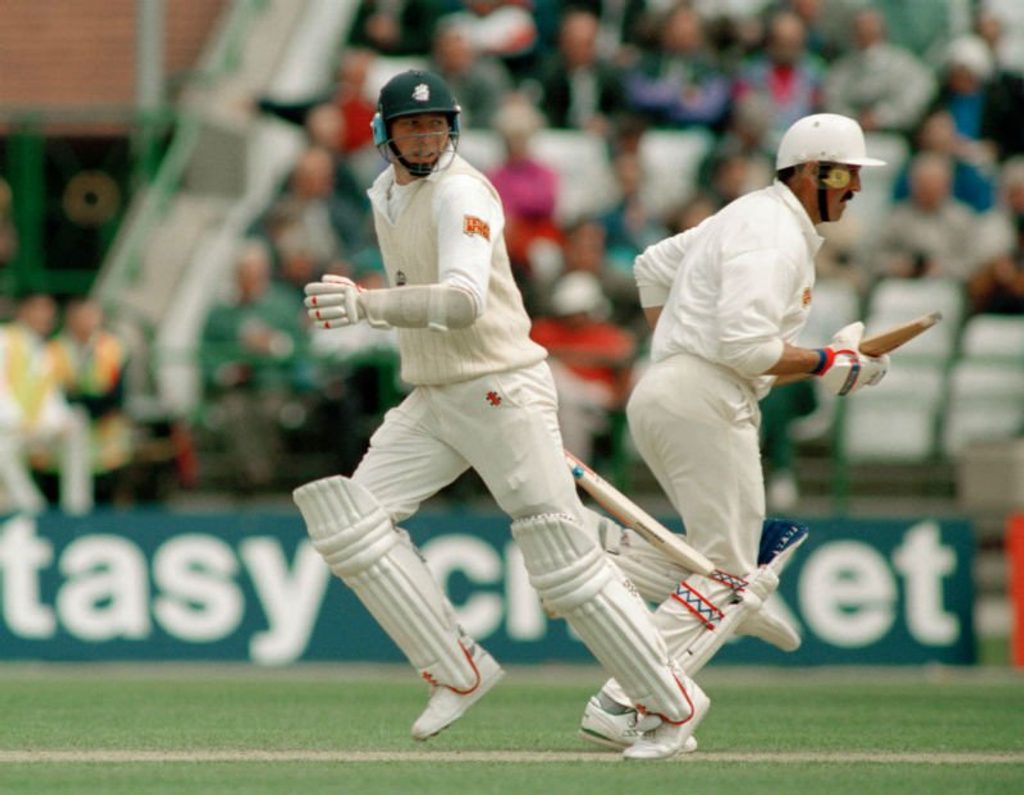 Atherton (left) took tips from Gooch to learn how to counter Warne
Atherton (left) took tips from Gooch to learn how to counter Warne
Smith was reluctant to ask for help, lest it show weakness, but Atherton picked the brains of Gooch, who played majestically for most of the series. “Goochie was a great player, and in his golden period,” says Atherton. “Informally, I would certainly chat to him and that’s how it was done then – peer-to-peer rather than the coaches giving you information.”
Some of the batsmen could not cope – mentally, technically or both. There were a number of embarrassing dismissals, either because the batsman offered no stroke or, in Gatting’s case, didn’t know they were out. Smith was dismantled, averaging 28 in the series before he was dropped for the final Test. “He just got inside my head,” says Smith. “He tormented me with demons that didn’t even exist. He barely said a word but the way he looked at me really unsettled me – it was superior and knowing, as if he’d already decided exactly how and when he was going to put me out of my misery.”
Smith was Hampshire captain when Warne joined the county in 2000, and they became best friends. On the first day of training, Warne bowled to him in the nets. “He got me out three times in about six deliveries,” says Smith. “As captain, I ordered him to bugger off, because I wanted to come out of the nets feeling upbeat about my game. It was only then – seven years after I faced him in the Ashes – that I realised just how big a hold he had over me.”





